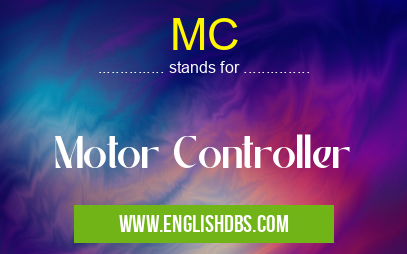What does MC mean in AIRCRAFT & AVIATION
MC stands for Motor Controller, which is an electronic device that controls the speed and direction of an electric motor. It is used in many applications such as robotics, industrial automation, and automotive systems. The main purpose of a motor controller is to provide smooth and efficient operation of the motor by controlling its speed and torque. Motor controllers can also be used to protect the motor from overloads or other damage caused by excessive current or voltage.

MC meaning in Aircraft & Aviation in Miscellaneous
MC mostly used in an acronym Aircraft & Aviation in Category Miscellaneous that means Motor Controller
Shorthand: MC,
Full Form: Motor Controller
For more information of "Motor Controller", see the section below.
Essential Questions and Answers on Motor Controller in "MISCELLANEOUS»AIRCRAFT"
What is a Motor Controller?
A motor controller is an electronic device used to control the speed and power of an electric motor. This can be done using either analog or digital circuitry. Motor controllers are typically used in applications such as propulsion systems, elevators, electrical vehicle charging, and industrial automation.
How does a Motor Controller Work?
A motor controller is typically composed of several components including a power switch, a converter, an energy regulator, and a feedback loop. The power switch controls the power supplied to the motor while the converter changes the voltage levels based on input from the control unit. The energy regulator limits the amount of current drawn by the motor and the feedback loop ensures that it's operating within parameters set by the user.
What Types of Motors Can be Controlled with a Motor Controller?
Most types of AC and DC motors can be controlled with a motor controller. This includes brushless and brushed motors, asynchronous and synchronous motors, stepper motors, servo motors, induction motors, permanent magnet synchronous motors (PMSM), split-phase induction motors (SPIM), dc brushless fans (BLDC) among others.
How Do I Select the Right Motor Controller?
When selecting a motor controller it’s important to consider factors such as application requirements in terms of speed regulation accuracy or torque control resolution as well as environmental conditions like humidity or temperature levels. Additionally make sure that your chosen product complies with global safety regulations for both industrial automation and automotive applications.
Does my Motor Controller Need to be Programmed?
The programming requirements will depend on your specific application but usually you can get away with using default values unless additional customization is necessary for special needs or applications that require precise control over torque or speed regulation. You should check if there are any settings that need to be configured in a particular way in order for your system to correctly operate.
What Are some Features of Modern Motor Controllers?
Modern motor controllers often include features like sine wave modulation for quieter operation; microcontrollers for improved system integration; dedicated drivers for 3 phase BLDC/PMSM applications; open loop vector controls; advanced diagnostics such as current monitoring; optical isolation circuits for noise immunity; built-in safe stop logic; multiple communication protocols support like CANbus/SAEJ1939/Modbus etc.; embedded protection functions etc.
What Are Safety Requirements For Installing Motor Controllers?
When installing motor controllers it’s essential ensure safety standards compliance at all times by following instructions provided by regulatory agencies such as UL/CSA/ENEC etc.. Generally speaking this includes proper grounding techniques for metal frames and chassis; correct cable/wire insulation selection according to local standards etc.
How Do I Test My New Motor Controller?
Typically you would perform functional tests to verify proper operation of your new motor controller before putting it into service. These tests can include thermal imaging scans of circuit boards or components to assess heat dissipation capabilities; output voltage verification checks against specifications output frequency accuracy testing against ratings etc.
Final Words:
In conclusion, MC stands for Motor Controller which is an electronic device that regulates the speed and direction of an electric motor used in various applications such as robotics and industrial automation systems among others providing different features like soft start/stop acceleration control and short-circuit protection for reliable operation over long periods of time.
MC also stands for: |
|
| All stands for Mc |
